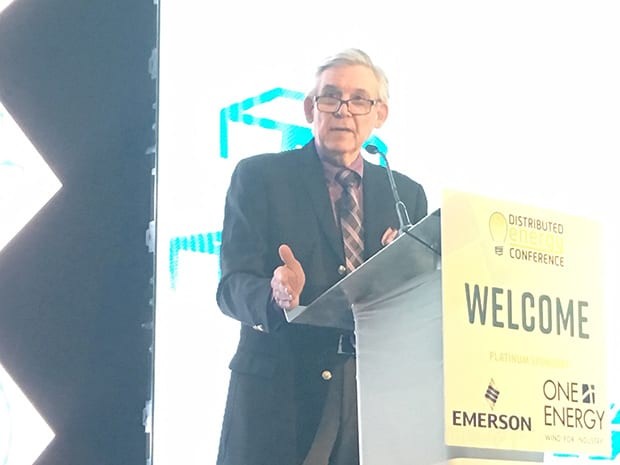Distributed Energy Is Disrupting the PowerIndustry: Is the Sky Falling?
News Resource: POWER
Utilities are faced with many disruptive changes in the power market. Customers are demanding cleaner energy and turning to distributed generation as a solution. One expert suggested power companies must react and evolve their business models to change with the times.
During a keynote presentation at the Distributed Energy Conference in Golden, Colorado,on October 17, Roy M. Palk, Esq. (Figure 1), president of New Horizons Consulting and former CEO of East Kentucky Power Cooperative, said, “The utility model, in terms of planning, has just been turned upside down. It will stay that way, in my opinion, for years to come.”

1. Roy Palk, Esq., president of New Horizons Consulting, gave a keynote presentation during the Distributed Energy Conference, in Golden, Colorado, on October 17, 2018. Source: POWER
However, Palk was not pessimistic about the future. He encouraged power utilities to “embrace the changes.” The three points that Palk wanted attendees to take away from his presentation were:
- Power companies were born and thrive on disruption. Palk pointed out that the initial electric grid was a direct current (DC) system,and alternating current (AC) provided the first industry disruption.Furthermore, utilities have had to adjust to changing regulations, fuels,technology, and many other disruptions over the years.
- Disruptive technologies do not mean destructive results. Palk noted that it's not just the power industry that is being disrupted by distributed energy, the financial sector and regulators, among others, have also been affected. However, he submitted that the changes can include positive effects, such as economic development. Distributed generation (DG) can make communities more competitive, more attractive to industries, and better able to provide jobs, which increase communities' tax base.
The end-use consumer is driving the changes. Power companies have a choice, they can embrace change or fight it. Palk suggested engaging with end-users and delivering what customers want is the best solution for all parties.
In Palk's talk, he showed a clip from the 2005 Disney movie “Chicken Little” in which the young chick causes great havoc with a pronouncement that “The sky is falling!” The point Palk was making is that the sky really isn't falling on the power industry. Palk didn't seem to believe utilities are doomed, as Jereme Kent, CEO of One Energy, suggested during an earlier presentation at the event.
Kent proposed power companies have been given a “terminal diagnosis,” and he referred to the five stages of grief first outlined by Dr. Elisabeth Kübler-Ross in her book On Death and Dying: What the Dying Have to Teach Doctors, Nurses, Clergyand Their Own Families to drive the point home. The stages are: 1) denial, 2)anger, 3) bargaining, 4) depression, and 5) acceptance. Kent suggested many power companies are still in the denial or anger stages, but some have advanced to bargaining and later stages.
Although Palk noted that disruptive technologies have turned the old utility model on its head, he didn't subscribe to the death-spiral mentality. “Be certain, ladies and gentlemen, the customer will always get what it wants, and if we [power companies] don't do it, they'll go behind the meter and they'll do it themselves with someone else.”
Palk said everybody loses in that scenario. “The utility loses credibility with the customer—they lose revenue from the customer—and the customer loses because they really don't want to be in the power industry.” Palk pointed out that when commercial and industrial companies are forced to deal with power supply issues it takes focus away from their core businesses, which is never a good thing.
“DG will continue to grow,” Palk said, because it's more reliable and in demand than ever before. “Utilities aren't driving the bus in the future—the customer's driving the bus,” he said. He emphasized that utilities need to react, need to look for new opportunities to work with customers, embrace the changes, and become leaders in the evolving power landscape. In other words, the sky is not falling.


 INHE Smart Power Distribution Industrial Base, Hi-tech Zone, Zhuhai, China, P.C.519000
INHE Smart Power Distribution Industrial Base, Hi-tech Zone, Zhuhai, China, P.C.519000
 +86 (0)756-368-9103
+86 (0)756-368-9103
 +86 (0)756-368-9169
+86 (0)756-368-9169

